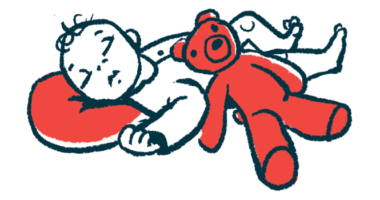Thyroxine levels in PWS toddlers not altered by growth hormone in study
Findings will help guide clinicians in the use of levothyroxine

Children younger than 2 with Prader-Willi syndrome (PWS) show no changes in the levels of free thyroxine (FT4) — the main hormone produced by the thyroid gland — following growth hormone treatment, a Japanese study shows.
In older children, those ranging in age from 2 to 7, growth hormone therapy reduced FT4 levels, but this was found to be a transient effect.
Researchers say the study findings will help guide physicians and specialists in the use of levothyroxine, a medicine used to treat an underactive thyroid gland, in young Prader-Willi children.
“This result will help clinicians establish a therapeutic strategy to decide the necessity of levothyroxine supplementation in GH [growth hormone]-treated children with PWS,” they wrote.
The study, “Very young children with Prader-Willi syndrome are refractory to growth hormone-associated decreases in free thyroxine levels,” was published in the Endocrine Journal.
Investigating thyroxine levels in PWS children
Prader-Willi syndrome is a rare genetic disease caused by the loss of or defects in paternal genes at a particular region of chromosome 15, called the PWS locus. Symptoms include low muscle tone with feeding difficulties during early childhood, and developmental delays, excessive appetite, obesity, and low levels of sex and growth hormones.
Treatment with growth hormone in PWS children may promote better body size outcomes, improve cognition, and potentially slow declines in motor function.
But while early growth hormone treatment in children younger than 2 has become more prevalent, questions remain regarding potential adverse effects.
Of particular concern is the possible reduction in FT4 levels induced by the growth hormone. FT4 is the active form of thyroxine, the main hormone produced by the thyroid gland, and plays a role in regulating metabolism, mood, and body temperature, among other processes. Researchers note that growth hormone is known to accelerate the conversion of thyroxine to triiodothyronine, another key thyroid gland hormone.
Previous studies have indicated a short-term effect of growth hormone treatment on thyroid hormone levels. However, a potential effect in children ages 2 or younger has not been extensively studied.
Now, researchers in Japan retrospectively analyzed the levels of the thyroid hormone and growth in 37 children with PWS. All had visited the Osaka Women’s and Children’s Hospital between 2002 and 2020. These patients were treated with growth hormone daily or six times a week, at a median starting dose of 0.19 milligrams/kilogram/week.
The children ranged in age from 1 month to 7 years (84 months), with a median age of 26 months, or just older than 2. For the study, they were divided into groups based on age: the younger group consisted of children ages 1 month to 2 years (24 months), while the older group included those from 25 months to age 7.
One month after starting growth hormone treatment, blood serum FT4 levels were significantly decreased, whereas levels of thyroid-stimulating hormone (TSH) were increased. TSH stimulates the thyroid to produce and release hormones. Levels of triiodothyronine were not altered.
When the effect of growth hormone treatment was analyzed separately in the two age groups, the younger children showed no effects on FT4 or TSH levels. In the older children, FT4 levels were decreased whereas TSH levels were increased.
This result will help clinicians establish a therapeutic strategy to decide the necessity of levothyroxine supplementation in GH [growth hormone]-treated children with PWS.
Typically, growth hormone treatment in young children is initiated at a lower dose that is gradually increased. As such, children in the older group were treated with a higher cumulative dose per body weight of the hormone during the first month than were the younger children.
A further analysis adjusting for sex and dose per body weight confirmed the positive correlation between age and the decrease in FT4 levels.
“These results indicate that 1 month of GH [growth hormone] treatment induced age-dependent decreases in FT4 levels independent of the cumulative GH dose per [body weight],” the scientists wrote.
Differences in FT4 levels seen between older, younger children
Nine children were given levothyroxine during the first year of growth hormone treatment due to abnormal TSH and FT4 levels. In the remaining 28 children who did not receive levothyroxine, FT4 and TSH levels were evaluated four times after growth hormone treatment initiation. The first evaluation was done at one month, followed by a second at a median of 4.1 months, a third at 8.8 months, and a fourth assessment at 15.1 months.
In the younger group, neither TSH nor FT4 levels were altered, whereas in the older group FT4 levels were temporarily decreased from the first to the third evaluation, but remained unchanged in the last evaluation. TSH levels were only increased in the first analysis, remaining within the reference range in most children.
“These results indicate that levothyroxine replacement is not mandatory when FT4 levels are decreased by GH treatment,” the team concluded.
But they added that, “based on clinical evidence showing the important role of the thyroid hormone status in psychomotor development in very young children, levothyroxine needs to be administered where appropriate.”
Among other study limitations, the researchers noted that their analysis did not consider a potential of non-thyroid issues, and the treatment with levothyroxine, which could impact the results. Also, the use of growth hormone for PWS in Japan is limited to those with growth delay, making it challenging to compare study results with those from other countries.
“To overcome these limitations, prospective studies with close monitoring to clarify the effects of GH treatment on the thyroid hormone status in children with PWS are needed,” the investigators concluded.







